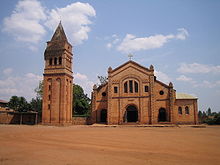
A country with an estimated resident population of 12,089,721, the Republic of Rwanda gained its independence from Belgium on July 1st, 1962. The Republic of Rwanda has a long history of ethnic conflict between the Hutus and Tutsis. The first record of the ethnic conflict was an episode in 1959 when the Hutus, supported by the outgoing Belgian ruler, overthrew the ruling Tutsi king. Over the next few years the ruling Hutus killed thousands of Tutsis while driving almost 150,000 into exile in neighboring countries. The descendants of these exiles formed a rebel group, the Rwandan Patriotic Front (RPF) and began a civil war in 1990. This war led to a state-orchestrated genocide against the Tutsi in April 1994 where up to a million Rwandan citizens were killed. The genocide ended when the RPF defeated the national army and Hutu militias and established a government of National Unity led by RPF but excluding all factions that participated in the genocide. Two-million Hutu citizens fled to neighboring countries fearing retribution. Local elections were first held in 1999 while the first post-genocide presidential and legislative elections were held in 2003 . Due to the clergy involvement in the genocide of 1994 tensions between religious leaders and the government are sometimes tense. This cannot be said for all churches. It was especially true for the Catholic Church. Fortunately, relationships have improved since the visit of the Head of State to the Vatican and the apology of the Pope for the church’s role in the 1994 genocide. Other churches did not have the level of tension with the government as did the Catholic Church.
The development of the country, since the genocide, led to the governing constitution being adopted by referendum in 2003, with periodic amendments up until 2015. The constitution created a presidential republic with executive, legislative, and judicial branches and a civil legal system that is currently undergoing a transformation from purely civil to a hybrid civil-common model.
RELIGIOUS CONTEXT
According to the 2012 census, Rwanda’s population is 44% Roman Catholic, 37.9% Protestant, 11.9% Seventh-day Adventist, 2% Muslim (with the Rwanda Muslim Community reporting they could constitute as much as 10% of the population) and 0.7% Jehovah’s Witnesses. Animists, Bahais, members of the Church of Jesus Christ of Latter-day Saints and Jewish individuals constitute less than 1% of the population while approximately 2.5% of the population holds no religious beliefs.
In general, protections for religious freedom are broad with the constitution prohibiting religious discrimination and allowing for freedom of conscience, religion, and worship. However, this freedom is not absolute as nighttime meetings and politically sensitive public meetings can be prohibited. In 2018, the government shut down thousands of churches claiming hygiene and security concerns.
For more information, including details about Sources of Law Affecting Religion, please see the link below.